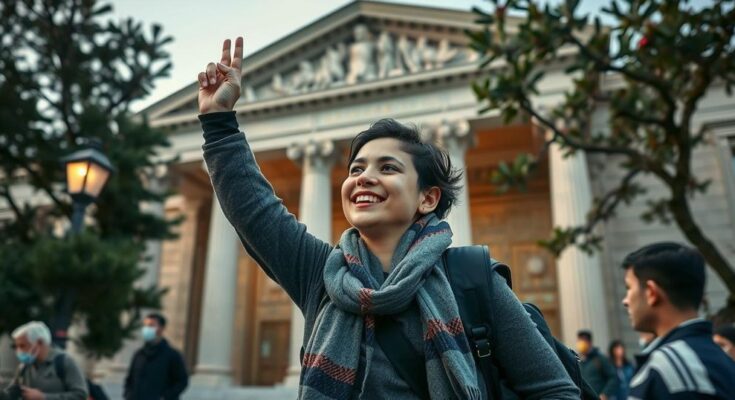Dana Abu Qamar, a Palestinian law student, successfully appealed the revocation of her UK visa after making statements about the Gaza conflict. The tribunal ruled that her remarks were not supportive of violence or extremist positions, affirming her right to free speech. The case highlights issues of immigration policy and political intervention affecting advocates for Palestinian rights.
A young Palestinian law student, Dana Abu Qamar, fought back against the UK Home Office after they revoked her student visa due to her outspoken views on the Israel-Gaza conflict. The tribunal sided with her, stating the government failed to justify that her presence would harm the public good, ruling her visa revocation as an infringement on her freedom of speech. Abu Qamar’s comments at a university rally and an interview highlighted the ongoing suffering in Gaza, which she described as a historic moment of active resistance against occupation. Abu Qamar, who has lost many relatives in the ongoing violence, faced scrutiny after referring to Israel’s actions as oppressive. Despite the backlash, she clarified that her advocacy is rooted in supporting Palestinian rights rather than endorsing violence. The tribunal deemed her language to be within the realm of lawful resistance, distinguishing it from support for extremist actions. In a notable legal win, Abu Qamar’s case emphasizes the necessity for free speech advocacy and the right to voice support for human rights. The revelations about government intervention indicated politicized motives behind immigration enforcement decisions, sending a concerning message to activists. As she rejoiced in her legal victory, Abu Qamar remained resolute in her commitment to peaceful advocacy for her community amidst the turmoil in Gaza.
The situation surrounding Dana Abu Qamar illuminates the complex intersection of immigration policy and political expression, particularly regarding advocacy for Palestinian rights. Abu Qamar’s case underscores the tensions between governmental responses to dissent and the protection of individual rights under human rights conventions. Such cases often reflect broader societal issues related to free speech, activism, and the political climate surrounding international conflicts.
The tribunal’s ruling in favor of Dana Abu Qamar stands as a significant affirmation of free speech rights. It illustrates the delicate balance between national security concerns and the fundamental right to advocate for human rights. Her experience underscores the challenges faced by activists in navigating political landscapes while remaining steadfast in their commitment to justice and solidarity with their communities.
Original Source: www.theguardian.com



